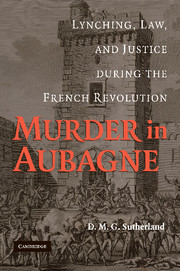Book contents
- Frontmatter
- Contents
- List of Figures
- Preface
- Acknowledgments
- Abbreviations
- Aubagne: An Introduction to the Problem
- 1 Structures and Events
- 2 The Olive Festival
- 3 Aubagne's Universe: Marseille, Aix, and Arles, 1789–1792
- 4 Murders in Provence
- 5 Vigilantism and Federalism
- 6 Federalism
- 7 Terror in a Small Town: Aubagne
- 8 The Revolution of the Antiterrorists: Vengeance, Massacre, and Justice
- 9 The Bande d'Aubagne
- Conclusion
- Appendix
- Sources and Methods
- Index
3 - Aubagne's Universe: Marseille, Aix, and Arles, 1789–1792
Published online by Cambridge University Press: 13 August 2009
- Frontmatter
- Contents
- List of Figures
- Preface
- Acknowledgments
- Abbreviations
- Aubagne: An Introduction to the Problem
- 1 Structures and Events
- 2 The Olive Festival
- 3 Aubagne's Universe: Marseille, Aix, and Arles, 1789–1792
- 4 Murders in Provence
- 5 Vigilantism and Federalism
- 6 Federalism
- 7 Terror in a Small Town: Aubagne
- 8 The Revolution of the Antiterrorists: Vengeance, Massacre, and Justice
- 9 The Bande d'Aubagne
- Conclusion
- Appendix
- Sources and Methods
- Index
Summary
The crisis of February 1792 in Aubagne showed how important the alliance with the brothers in Marseille was. In turn, the incidents surrounding the Olive Festival show that Marseille was passionately interested in promoting the fortunes of Jacobins in its hinterland. From then on, the destinies of the small town were a function of the history of the neighboring metropolis. To understand what happened in Aubagne, one must understand how Marseille came to be a Jacobin powerhouse.
An examination of the wider universe in which radical politics in Aubagne operated also demonstrates a number of features of democratic politics that would otherwise be impossible to recover. The broad context therefore helps us to understand Aubagne itself. Democratic politics in this region was far more than the familiar round of voting, club meetings, pamphlets, petitions, and the press. Such things were Jacobin politics in the lower key. At the highest key, democratic politics required a constant mobilization, a ceaseless movement of marches, and expeditions of extraordinarily high energy. This was the expression of sovereignty in its purest form: direct, dazzling, violent, and often cruel.
Glimmers of Liberty: Marseille
The source of popular politics in Marseille and the other urban centers of what became the Department of the Bouches-du-Rhône was the same as that in Aubagne: municipal taxes. By the time the Estates General began meeting in Versailles in May 1789, tax privileges for the Provençal nobility were no longer an issue.
- Type
- Chapter
- Information
- Murder in AubagneLynching, Law, and Justice during the French Revolution, pp. 64 - 87Publisher: Cambridge University PressPrint publication year: 2009



